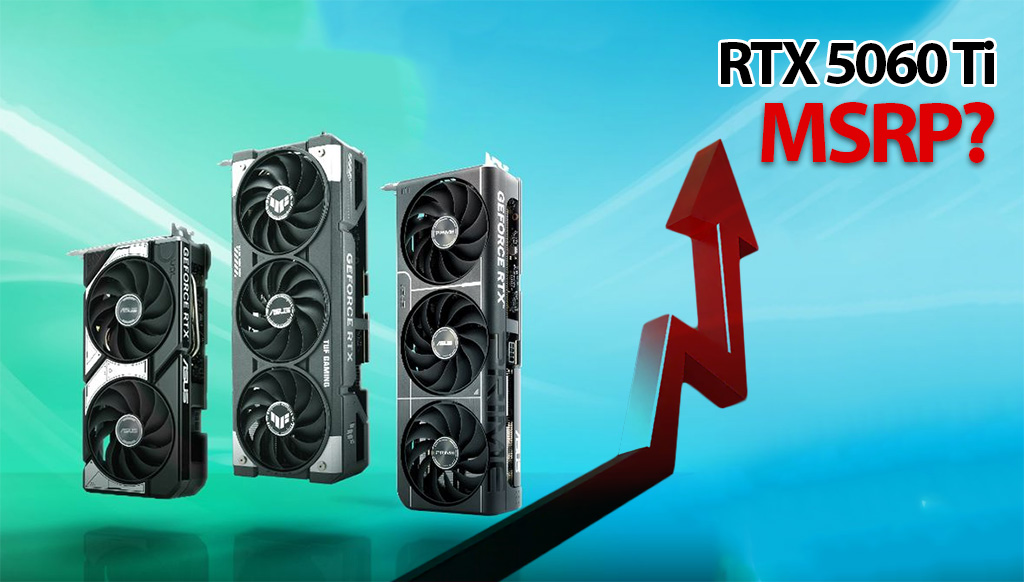RTX 5060 Ti for Local LLMs: It’s Finally Here – But Is It Available, and Is the Price Still Right?

The much-anticipated NVIDIA RTX 5060 Ti has finally hit retail shelves, with the 16GB model now available from major retailers like Newegg and Best Buy. Initial pricing has settled between $470-$570 for most standard models, representing a modest 10-23% premium over the stated $429 MSRP. While premium models like the ASUS TUF Gaming OC edition command a steeper $599 price tag, the more reasonable pricing of standard variants keeps this card firmly in contention for budget-conscious LLM enthusiasts.
Pricing Analysis in Context
Current market positioning places the RTX 5060 Ti 16GB in an interesting position relative to its predecessors and competitors:
| Model | VRAM | Memory Bandwidth | Current Price | Price/GB VRAM |
|---|---|---|---|---|
| RTX 5060 Ti 16GB | 16GB | 448 GB/s | $470-$530 | $29-$33 |
| RTX 4060 Ti 16GB | 16GB | 288 GB/s | $389-$449 | $24-$28 |
| RTX 3060 12GB | 12GB | 360 GB/s | $259-$289 | $22-$24 |
| RTX 3090 (Used) | 24GB | 936 GB/s | ~$900-1000 | $38-$42 |
Even with the slight price premium over MSRP, the 5060 Ti delivers substantial value when considering its significantly improved memory bandwidth – 55.6% higher than the RTX 4060 Ti 16GB. This enhanced bandwidth directly translates to faster token generation when running inference on local LLMs, which remains the primary bottleneck for many quantized models.
The Compelling Dual-GPU Equation
With actual retail prices now established, we can refine our analysis of dual-GPU configurations. Two RTX 5060 Ti 16GB cards will cost approximately $940-$1060, still representing tremendous value compared to single high-VRAM alternatives:
| Configuration | Total VRAM | Effective Bandwidth | Approximate Cost | TDP |
|---|---|---|---|---|
| 2× RTX 5060 Ti 16GB | 32GB | 448 GB/s | $940-$1060 | 360W |
| RTX 3090 (Used) | 24GB | 936 GB/s | ~1000 | 350W |
| RTX 4090 | 24GB | 1008 GB/s | $1599-$3300+ | 450W |
While the pricing comes in slightly higher than our initial $858 projection based on MSRP, a dual RTX 5060 Ti configuration still maintains a compelling value proposition for enthusiasts looking to run larger models that require more than 24GB of VRAM. This setup allows comfortable execution of 32B parameter models in 4-bit quantization with extended context windows—a capability previously unavailable at this price point.
Where to Buy the RTX 5060 Ti 16GB
Newegg and Best Buy currently serving as the primary stockists in the US market. At the moment there is no inventory and the premium models are commanding significant price premiums over NVIDIA’s stated $429 MSRP. Below is a breakdown of current availability and pricing across various AIB partner models:
| Model | Retailer | Price | Status |
|---|---|---|---|
| Asus Prime GeForce RTX 5060 Ti 16GB | Newegg | $479 | Sold out |
| Asus Dual GeForce RTX 5060 Ti 16GB | Newegg | $479 | Sold out |
| Zotac Twin Edge GeForce RTX 5060 Ti 16GB | Newegg | $472 | Sold out |
| Asus Prime GeForce RTX 5060 Ti 16GB | Best Buy | $479 | Sold out |
| Asus Prime GeForce RTX 5060 Ti OC 16GB | Best Buy | $529 | Sold out |
| Asus TUF Gaming GeForce RTX 5060 Ti OC 16GB | Best Buy | $599 | Sold out |
Market Implications
The arrival of the RTX 5060 Ti at reasonable prices creates several interesting dynamics in the LLM hardware ecosystem. First, we should closely monitor pricing trends for the RTX 4060 Ti 16GB on the second-hand market, as it could become increasingly attractive for budget builders if prices drop further in response to this new release. A dual 4060 Ti setup could approach the $800 mark in coming months, creating another viable 32GB configuration.
Additionally, the widely available 3060 12GB presents an interesting alternative for those looking at multi-GPU setups on an extreme budget. Two of these cards provide 24GB of VRAM for approximately $520-$580, though with bandwidth limitations that will affect token generation speed.
Waiting on LLM Benchmarks
The current pricing landscape makes the RTX 5060 Ti 16GB an attractive option, but definitive recommendations await proper LLM-specific benchmarks. Key questions remain about how effectively the card’s PCIe 5.0 x8 interface facilitates cross-GPU communication in tensor parallel setups, and how the raw specifications translate to real-world token generation rates across different model sizes.
For enthusiasts currently running inference on 7B parameter models who are looking to step up to 14B or even 32B models (in dual-GPU configurations), the RTX 5060 Ti presents a forward-looking option with a reasonable price premium. The higher initial outlay compared to older cards is likely justified by the improved specifications, newer architecture, and longer expected driver support lifecycle.
As inventory continues to arrive at retailers and more AIB partner models become available, we expect pricing to stabilize closer to MSRP. For now, the RTX 5060 Ti 16GB remains a solid contender for LLM enthusiasts willing to pay a small premium for substantially improved capabilities—particularly those exploring dual-GPU configurations to tackle larger models.
